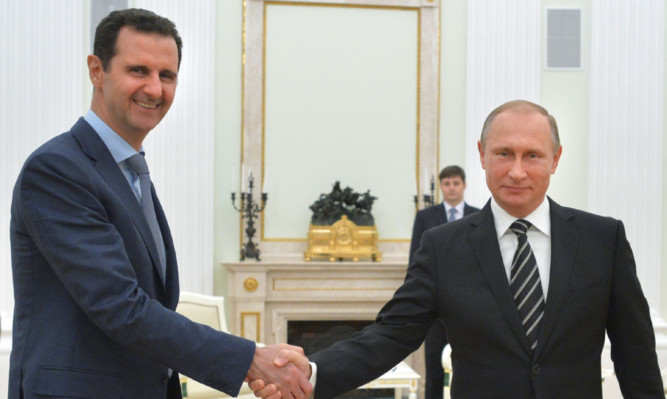Mr Putin says the Russians have withdrawn from Syria but this is only partly true, since he retains a naval base at Tarsus on the Mediterranean and a multi-purpose military base at Latakia.
It is true that some aircraft and aircrew have conveniently been filmed landing in Russia and been garlanded with flowers and patriotic music. However, Russia retains a significant military presence in Syria.
Mr Putin says his strategic objectives have been achieved but this is only part of the answer to the question of why should Russia partially withdraw at this stage.
It is certainly true that he has shored up the Assad regime at least for the moment.
However, President Assad should remember what happened to President Milosevic of Serbia, whom the Russians abandoned when they no longer had any use for him. He finished up in the International Criminal Court in the Hague.
Big influence
As well as the continuing possession of military bases in Syria, Mr Putin retains the political influence achieved by his decisive and unexpected military intervention and now there can be no settlement of the Syrian question without Mr Putin’s endorsement.
It is a principle of foreign relations that the reasons given by governments for their actions are often not the real reasons. As a result, speculation abounds.
Is Mr Putin saying to President Assad “I have saved you and your administration” so that he can better control events in Syria thereafter. Or, to put it more simply, is he saying “when I say jump you jump”.
Whatever the case now, Russia has been ambiguous in the past about Assad.
In the beginning, Putin seemed to accept that Syria could not have long-term stability as long as Assad remained as president. However, once President Obama said Assad must go, Russia changed its tune.
Here in the United Kingdom, David Cameron said the same as Obama but unofficial sources have suggested that if a settlement depended on a temporary role for Assad, Great Britain would not oppose it.
It is more difficult for President Obama, perhaps. However, he is in the last 10 months of his presidency and if any settlement in Syria is to be achieved, it is more than likely his successor would be asked to sign off the deal. Trump or Hillary? Who knows.
Even a temporary role for Assad would be hard for many people both inside and outside Syria to swallow.
He has presided over an administration which has been brutal towards its own citizens.
There is credible evidence the administration has used chemical weapons. It has certainly used the dreadful barrel bombs, with resulting indiscriminate slaughter of civilians and fighters alike.
However, if in any settlement his survival as president of Syria for say 18 months was the price to be paid for the return of stability, it could be a matter of pragmatism rather than principle which determines his fate.
The cessation of hostilities on February 27 has certainly resulted in a reduction in violence in Syria but it has not eliminated it.
There are continuing reports the Assad regime, under cover of the cessation, has pursued military activities, including the use of the fearsome barrel bombs.
So where to now? The most urgent step is for humanitarian assistance to those who have been besieged, who have lost everything and are starving. The seriousness of their situation can hardly be imagined.
Perilous plight
But it is still indicative of their plight that they are willing to risk their lives and those of their children (born and unborn) in perilous journeys by land and sea to escape.
However, much depends on Putin. Is his stated reason for winding down military action a valid one? We cannot be sure.
Has the financial cost of the Syrian operation become too much to bear in a country heavily suffering financially from the sanctions imposed as a result of his adventurism in the Ukraine?
Or has reduction in military action been designed to assert that Damascus can only rely on Moscow if it is in the interests of Russia and Putin himself?
Could it even be that Putin has decided Assad’s day is over and that it is now time to install another compliant figurehead?
It should always be remembered when dealing with Putin that his whole conduct is directed towards satisfying a craving that the world should treat Russia as a serious player in international affairs.
His is an extreme nationalism fuelled by resentment at the way Russia was sidelined after the collapse of the Soviet empire.
The days of Gorbachev and Yeltsin are long gone. And now for Russia, the recovery of international influence is paramount.
It is even possible we might see in Syria the emergence of Putin the peacemaker.
Don’t hold your breath but don’t exclude it either.
